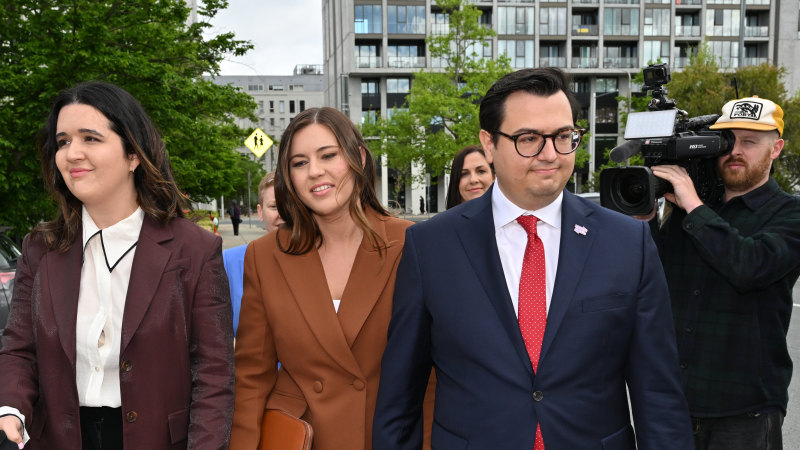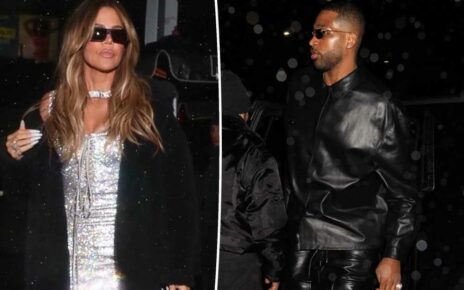Save articles for later
Add articles to your saved list and come back to them any time.
An officer who investigated Brittany Higgins’ rape allegation said she and her partner David Sharaz used the media as a tool and the former Liberal staffer wanted to see how the story of her claim “played out” before providing a statement to police.
ACT Policing Senior Constable Emma Frizzell told an inquiry into the handling of the abandoned Bruce Lehrmann trial that Higgins, his accuser, said to her that conversations with a journalist had muddied her recollection of events, and also revealed the extensive media coverage made it difficult to speak to witnesses.
Former Liberal Party staffer Brittany Higgins and partner David Sharaz arriving at the ACT Supreme Court during the October 2022 trial. Credit: AAP
In her written statement provided to the inquiry, Frizzell said that during a rest break in Higgins’ first recorded interview in March 2021, Sharaz “entered the room and without concern for Ms Higgins’ welfare, commenced showing and discussing media coverage to Ms Higgins”.
“I believe the level of media involvement did affect the conduct of the investigation of Ms Higgins’ complaint,” Frizzell said.
“I believe it was a tool driven by Ms Higgins and Mr Sharaz, which is evident by the first engagement I had with them whereby Ms Higgins advised she wished to see how the media played out prior to providing a statement.”
Lehrmann pleaded not guilty to raping Higgins in the parliamentary office of their then-boss, Liberal senator Linda Reynolds, on March 23, 2019, and has always maintained his innocence. The trial was aborted on October 27 due to juror misconduct and there have been no findings against Lehrmann.
ACT Police Senior Constable Emma Frizzell investigated Brittany Higgins’ rape allegation.Credit: Alex Ellinghausen
Frizzell said that in early 2021 Sharaz told her Higgins had done a pre-recorded interview with Ten’s The Project but had not wanted to say anything to the officer for “fear of being judged”.
Under questioning from Lehrmann’s barrister Steven Whybrow during the trial, Higgins said she was speaking to both police and the media to highlight what she believed was a systemic cultural problem.
“I wanted to reform this issue,” she said at the time. “I stand by my choice and I’m not ashamed of that.”
The senior constable said in the statement she was concerned about Higgins’ credibility due to her providing different information to police and witnesses about seeking medical attention following the alleged incident, and comments made to Sharaz that Frizzell interpreted as Higgins trying to hide or delete evidence on her phone.
Higgins said during the trial she was fearful of what information could be handed on politically after it was seen by police.
“I was trying to give them to people, I wanted them to exist,” Higgins said of photos and messages she kept on her phone.
She also said that in deleting data, she was trying to “scrub” away aspects of her life.
Frizzell said Higgins told her that news.com.au journalist Samantha Maiden was relaying to her what she had uncovered before reporting on it in the media.
“Ms Higgins added at times Ms Maiden’s comments influenced her memories and questioned if her memory is a result of being told information,” the officer’s statement says.
The inquiry has heard the media fuelled the pressure the investigating team was under, with another officer telling the inquiry he believed the case was being rushed to court to placate the media.
Frizzell said the media interest affected the evidence witnesses provided, with one witness unwilling to offer some evidence in a recorded statement, while another person refused to give evidence because it could affect his future.
After ACT Director of Public Prosecutions Shane Drumgold, SC, announced he was discontinuing the case against Lehrmann on December 2, the ACT government launched a review into the handling of the case, which was partly spurred by a public breakdown in the relationship between the police and the DPP.
Australian Federal Police acting assistant commissioner Joanne Cameron, who was deputy chief police officer in the territory at the time of the trial, told the inquiry on Thursday she feared investigators speaking with Lehrmann’s lawyers during the trial would fuel rumours of police conspiring with defence.
“I held the concern that, at the very least, whenever these sorts of interactions were occurring, if they become known to others, there would be judgments made, not even knowing what the conversations were about … others would make a judgment unfairly against my officers,” Cameron said.
In her written statement, Cameron said the constant media attention generated a “trust no one mentality”.
She said that in April 2022, after Drumgold warned the police the ABC would publish a story about the wrongful service of Higgins’ counselling notes on Lehrmann’s original defence team, her subordinate Detective Superintendent Scott Moller told her it was “clear” that Drumgold had told the journalist.
Cut through the noise of federal politics with news, views and expert analysis from Jacqueline Maley. Subscribers can sign up to our weekly Inside Politics newsletter here.
Most Viewed in Politics
From our partners
Source: Read Full Article




